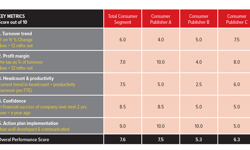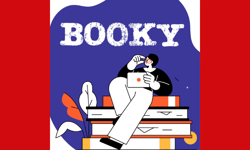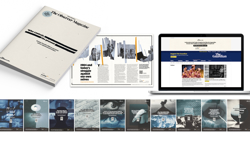If there was one word that taxed the minds of media moguls more than most last year, it was the T-word – trust.
Little wonder when they were already threatened on three fronts. Revenues wobbled with advertising volumes, audiences continued to dissipate and then there was, and is, the uncertainty of the new media revolution. Everyone may have at last come to terms with convergence – and the opportunities offered to traditional media by mushrooming new platforms for news delivery – but no one can confidently predict precisely where it is taking us.
It was this uncertainty that, more than a year ago, led the Society of Editors to choose ‘trust’ as the main theme for its 2007 annual conference in Manchester.
For two years, the debate had been about should, or how should, traditional newspapers get involved online. Once the decision was made that they should, the pace of change was electrifying. Everyone, from some of the biggest to some of the smallest newspapers, was catching up fast. Websites were revamped, complete with audio and video streaming and journalists were rapidly becoming multi skilled. Editors and publishers were also looking at still newer platforms including mobile phones.
Alongside the technology and the training, there was recognition that new relationships could and should be struck with potential audiences. As the volcanic eruption gathered pace, it was ushering in the age of user generated content and the citizen journalist.
It was fine that there would be new platforms and new kinds of journalist but what would this mean for the coveted, highly polished brands that everyone had worked so hard to create and maintain? Readers might be persuaded to trust newspapers’ video and audio content and they might also be satisfied that reports on a newspaper branded website would be of a similar high standard to the printed word, but would they learn to love and trust bloggers and ordinary people like themselves to submit accurate reports and images?
So, "A matter of trust" was adopted as the conference title long before controversies over phoneline rip-offs or changing the name of a children’s TV pet dominated the headlines.
Tarred with the same brush
While in 2007 the biggest questions about trust concerned broadcasting, newspapers had been there before and so there were sighs of relief that someone else was getting it in the neck.
Sadly, it is not that easy. When one bit of the media gets a kicking, some of the rubbishing rubs off on the rest. It is part of the peculiar ambivalence of the public. For decades, they have said with one breath: "Don’t believe what you read in the newspapers" and with the next they argue that black is white – because they read it in the xyz, saw it on the telly or heard it on the radio.
In those far off days when they used to shut the pubs, at throwing out time, sports desk phones would ring red hot with calls asking them to settle an argument about who won the cup in 1930 something or who scored a century before lunch and then went on to play for Arsenal in the afternoon.
What that has told us about newspapers is that for well over a century, they have become an important part of everyday culture and will remain so. It does not mean, however, that they can risk being cavalier with the demands of their audiences.
The right circles
Quite the opposite is the case. Newspapers, and indeed any other media organisations, have to compete in our increasingly full lives to grab 15 minutes of our time. If they succeed, they may have a chance of completing a virtuous circle.
It is extremely simple: provide carefully targeted, high quality content and audiences will be attracted. The audience provides a platform for advertising which brings in the revenue for profits and, crucially, to reinvest in the journalism that creates the content.
The other side of the coin, the vicious circle, is even easier to describe. Give them any old rubbish that they do not want and there is no chance of maintaining an audience and therefore still less of selling ads and making money.
What is complex is not so much how to hook readers but how to keep them. That is where trust comes in. First define the market, then research and design the kind of news, information and entertainment that will satisfy that market. It has to be the kind of journalism – and other information including advertising and promotions – that is credible in that market. One size certainly does not fit all.
A trusted friend?
Trust is vital at several levels. Readers certainly want to be told the truth and they must be confident that they can settle those arguments in the pub or over the dinner table, depending on the chosen market. They also want to be sure that what they will get inside their paper is precisely what it says on the packet. A posh up-market former broadsheet is not better than a red topped tabloid, they operate in different markets. Their readers want the content they want, not what a university commentator, still less a politician, thinks they should want.
That does not mean that newspapers can pander to the lowest common denominator. It means that some readers, in fact most readers if you look at the sales and readership figures, want a different diet from that which academics and politicians think they should have.
When newspapers get it right, the balance of ambivalence sways in their favour. Readers become fiercely loyal to their chosen titles. In the best instances, the newspaper moves from being not only handy to being really useful and, if they get it right, they become essential, helping readers to live their lives.
They become a friend dropping in as a famous Manchester Evening News promotion once proclaimed. All of the enduring newspapers can claim something similar. But that friendship can go out of fashion. Editors and journalists have to use their creative talents to continually renew their contracts with their readers, updating on the basis of demographics and market trends.
There has been something of a rearrangement of the hierarchy of national newspapers, but even those great titles that have lost sales remain powerful brands that are not easily written off. The most successful are those that re-invest most in the quality and credibility of their content.
Regional strength
In addition, there are hundreds of local and regional newspapers that maintain special relationships with the communities they serve. They are trusted to inform them, fight their battles and provide platforms for their views. They tell their readers where to pick up bargains and provide special discounts and deals for their regulars.
Many have suffered sales decline and all face new challenges, but they are fighting back with a mixture of print and new platforms. There are signs that they have got their confidence back and that they are successfully renewing their relationships.
They remain huge brands, often the most powerful in their localities. Unlike fictional stereotypes, their readers expect a knock on their doors in times of joy or tragedy and welcome their reporters in - because they trust them.
They have seen the damage when newspapers, national or regional, have betrayed trust by reporting stories that did not have local credibility or behaved in a manner that was simply unacceptable. The closeness of the relationship does not mean that newspapers cannot criticise or that readers accept every dot and comma of what they report or comment. Like family or close friends, they will not flinch from telling editors when they have acted inappropriately.
All of this shows that claims the media has betrayed the trust of its audiences are misplaced.
A feral beast?
Former Prime Minister Tony Blair asserted that journalists were behaving like feral beasts undermining the nation’s trust in politicians. He mistakenly thought that because opinion polls held some journalists alongside politicians and estate agents in public esteem that he would be loudly applauded. He missed the fact that the polls provide more complex results concerning trust. He also failed to understand the lessons of the Hutton report that blamed the BBC but let off the government lightly. The public thought it was a whitewash and continued trusting the BBC.
Similarly, in 2002 Onora O’Neill of Cambridge University, in discussing the crisis of trust across a range of British institutions, lectured the media in general and the press in particular for being unaccountable.
It would be foolish to deny that the press still has lessons to learn but the critics miss some fundamental issues. The first is that without trust, newspapers would not have any readers and therefore they work hard to win their respect. The second is that there are many reasons why newspaper circulations are falling and it has to be proven that declining trust is a major consideration.
Trust is hard to earn and easy to lose but half the population reads a regional or national newspaper every day and local and regional newspapers are read by more than 80% of the population every week.
That is hardly a dying habit and it seems like pretty powerful and regular accountability to me. It would be strange indeed for newspapers to maintain such massive popularity if their customers did not trust what they were reading.
FEATURE
The T-word
With continuing media fragmentation and the rise of citizen journalism, the issue of trust is ever more pertinent for publishers. Titles which are trusted sources of information and entertainment shine like beacons through the thickening media mist. But, trust does not come about by accident – it is the result of consistent hard work and investment. Get it right, says Bob Satchwell, and your title will always find an audience.










